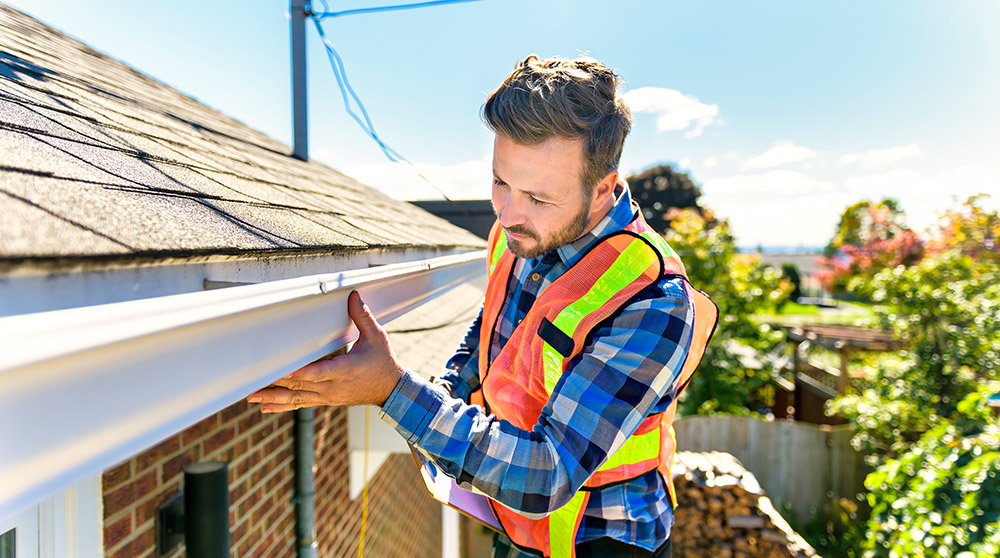Do you know water harm is without doubt one of the most typical and costliest dwelling insurance coverage claims? Accountable for billions of {dollars} in harm yearly, it will possibly wreak havoc in your property and pose well being dangers to you and your loved ones. Nevertheless, with correct planning and proactive upkeep, you’ll be able to considerably cut back your danger. To learn to forestall water harm in your house, learn on for our professional recommendation.
- Commonly examine your roof. The primary line of protection in opposition to water harm is a well-maintained roof. Examine yours at the very least twice a 12 months and be looking out for lacking or broken shingles, cracks, or leaks. Promptly tackle any points that will come up. (For extra, learn: Does your roof must be repaired or changed?) Moreover, you probably have a chimney, have a look at its exterior for free mortar or cracked bricks and seal as wanted. You can too examine from the within of the attic. For those who see indicators of leakage or mild coming by, it could be time to name knowledgeable for a full inspection and restore.
- Hold gutters and downspouts clear. Clogged gutters and downspouts could cause water to overflow and accumulate close to your private home’s basis, which might result in structural harm. We advocate inspecting your gutters and downspouts twice a 12 months and eradicating any particles — corresponding to leaves, branches, or grime — that could be blocking the circulation of water. Moreover, make sure that downspouts are secured and directed away from your private home’s basis to stop basement flooding and foundational points.
- Seal basements and crawl areas. Moisture intrusion in basements and crawl areas can result in mildew progress and structural harm. To stop this, guarantee your basement partitions and flooring are correctly sealed and waterproofed. You must also examine your basis for cracks and promptly restore any points you uncover. For those who use your basement for storage, put money into waterproof bins and preserve your belongings saved on shelving models — not the ground. By no means retailer high-value gadgets in these areas which might be extra vulnerable to water accumulation and moisture.
- Examine and keep home equipment. Commonly inspecting and sustaining home equipment that use water, corresponding to washing machines, dishwashers, and water heaters, can reduce the chance of a leak. Examine for indicators of wear and tear on hoses and connections yearly and substitute them as wanted. Investing in ground pans to position below home equipment is a cheap strategy to catch early indications of an issue and forestall harm.
- Use water sensors. A water detector is a small digital machine that may provide you with a warning of potential leaks or flooding, so you’ll be able to shield your property and decrease the potential for pricey repairs. Place them close to home equipment like washing machines, sizzling water heaters, dishwashers, sump pumps, and bathrooms, in addition to in your basement and different areas vulnerable to flooding.
- Know the place your water most important is. In case of a burst pipe or intensive leak, rapidly shutting off the primary water provide can assist decrease the harm to your private home. With that, you’ll wish to make sure that everybody who lives with you is aware of the place it’s and the way it works.
- Hold a detailed eye in your water invoice. Don’t let water harm drain your checking account. Monitor your month-to-month invoice so you understand how a lot water you normally use, and if you happen to see a big spike, seemingly with out an evidence, search for a leak.
- Examine the sump pump. Often positioned within the basement or crawl house, your private home’s sump pump can assist forestall inside flooding by eradicating extra water. You possibly can routinely examine this by making certain the pump is related to the GFCI electrical outlet and is pouring water into the sump pit. If it’s working correctly, the pump ought to activate and take away the water.
- Swap to PEX pipes. When you have an older dwelling, it’s doubtless you will have copper piping, which was the usual for many years. Sadly, as a result of nature of this materials, it has been phased out for good motive. Soldered joints and corrosion can develop pinhole leaks that may drip and wreak havoc on ceilings and partitions. Whereas replumbing a complete dwelling could be pricey, making incremental swaps for corrosion-free plastic PEX pipes pays dividends.
Understandably, water harm could be an awesome burden for householders, as it will possibly result in pricey repairs, lower the worth of your property, pose dangers to your well being, and disrupt your regular routine. That’s why maintaining an in depth and up-to-date dwelling stock is essential if it’s a must to file a declare. Having a complete report of what’s in your house and the way a lot it price can prevent time and assist expedite the claims submitting course of. Don’t have a house stock? It’s by no means too late to begin one. Learn: Find out how to do a house stock.
Now that you understand how to stop water harm in your house, the following step is speaking to an agent about your insurance coverage. Ensure you know what sort of water harm is included in your householders coverage, and what choices can be found so as to add onto it. To begin a dialog now, discover a native, impartial agent close to you.

